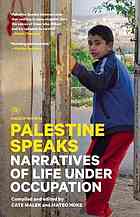
Palestine Speaks
Narratives of Life Under Occupation
- اطلاعات
- نقد و بررسی
- دیدگاه کاربران
نقد و بررسی

Starred review from September 29, 2014
This eloquent study shows the Israeli-Palestinian conflict in the West Bank and Gaza through the eyes of the people who live it each day. Hoke and Malek have transcribed 15 interviews, out of many more conducted over the course of four years, to convey a diverse cross-section
of Palestinian life. They begin with the
director of a West Bank children’s center, whose disabilities, caused by childhood polio, prove unexpectedly linked to the political impediments placed on her mobility. They go on to cover a young female Gaza journalist’s uncomfortable attempts to negotiate the patriarchal Hamas government and a Bethlehem defense lawyer’s memories of two decades within an Israeli prison. Since Israelis now make up an
estimated 10% of the occupied territories’ population, the editors also include two Israeli voices—one belonging to a security officer for an Israeli settlement and the other to an activist opposed to the West Bank wall. Though the book’s somewhat narrow focus excludes Palestinian experiences within Israel or the wider diaspora, its grounding in personal experience and the contours of daily life still makes for an excellent introduction to a controversial subject. Hoke and Malek’s work should prove a sturdy and revelatory resource for those looking for
a deeper understanding of an intractable conflict.

October 1, 2014
An oral history of life in Gaza and the West Bank, obtained through interviews conducted over a period of nearly four years, lets a diversity of Palestinians speak their minds about their situations. Hoke (English/Bethlehem Univ.) and Malek are journalists with Voice of Witness, a nonprofit organization dedicated to examining human crises around the world. With the aid of translators and transcribers, they recorded the voices of 50 interviewees and then edited the transcripts for clarity. Of the 16 people selected to tell their stories here, only two are Israelis, for the object is not to provide balance but to illustrate what life is like for Palestinians. Male and female, young and middle-aged, educated or not, mostly but not all middle class, these Palestinians narrate their experiences growing up and living next to Israelis or in areas where Israel controls major aspects of their lives. Some took part in the Intifadas, some spent time in prison, and some lived for years outside Palestine and then chose to move there. Some are resigned to the restrictions of their lives, while some are hopeful of a brighter future. About 50 pages of appendices give context to their personal stories. The first, "Timeline of Modern Palestine," opens with the date 8000 B.C. and ends with 2014 but has no mention of the events of that explosive summer. Appendix III is an essay on Palestine and international law by Allegra Pacheco, the wife of one of the Palestinian interviewees, and Appendix IV is a piece by journalist Nicolas Pelham on the Gaza tunnels that focuses on their economic importance to Hamas. The oral histories that make up the bulk of the book paint a harsh picture of Israeli restrictions on the lives of Palestinians; however, failure of the lengthy appendices to discuss the necessity for such restriction-suicide bombers, rocket attacks, Hamas' stated goal of the destruction of Israel-is a serious flaw. A sympathetic view of Palestinians not to be mistaken for objective reporting.
COPYRIGHT(2014) Kirkus Reviews, ALL RIGHTS RESERVED.

Starred review from December 1, 2014
Malek and Hoke spent nearly four years interviewing more than 50 individuals while working on this compilation. Their focus is on the experiences of Palestinian people. Those interviewed--16 of whom were chosen to be represented in this collection--narrate their stories, offering their experiences living, working, and struggling to survive in the West Bank and the Gaza Strip. Two of the accounts are offered by Israeli citizens, who comprise roughly ten percent of the population in the occupied territories. Each person's narrative shows pervasive exposure to ongoing violence. A common theme throughout the Palestinians' heartbreaking descriptions is a lack of optimism or hope for an improved future while currently surviving on exiguous means. In some cases, these voices suggest fighting for the future but ultimately speak as though failure is inevitable. In contrast, both Israeli citizens indicate that they see the situation improving and believe that there is hope ahead. The stark differences in the citizens' lives that develop these opposite mind-sets is made clear as these people share their most intimate struggles. VERDICT An absolute must for anyone interested in the Arab-Israeli conflict or with an interest in human rights. This book, similar to the other titles in the series, is an excellent way of developing a deeper understanding of people living the encounters about which we read in the papers and watch on the news.--Brenna Smeall, AtoZdatabases, Omaha, NE
Copyright 2014 Library Journal, LLC Used with permission.




دیدگاه کاربران